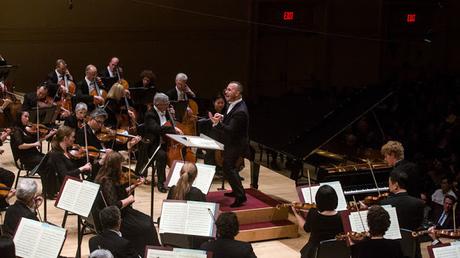by Paul J. Pelkonen

Yannick Nézet-Séguin (center) Jan Lisiecki (right) and the Philadelphia Orchestra.
Photo by Ebru Yildiz for National Public Radio.
Mr. Muhly's contribution to the program was the New York premiere of Liar, his orchestral work drawn from the same musical material as the composer's 2018 opera Marnie. Marnie was a succes d'estime when it premiered at the Met last fall. It is based on Winston Groom's novel of the same name, which also served as the basis for a notorious 1964 Alfred Hitchcock film starring Tippi Hedren and Sean Connery. (There are some plot differences between the Hitchcock film and the opera plot which adheres more closely to the original novel.)
However, this is not just a concert suite of highlights with the vocals shaved off. Rather, it is a tone poem, representing the conflict between the neurotic, kleptomanic title character and the wealthy alpha male type who marries her, rapes her and sets about trying to "save" her from herself. These two lovebirds are represented by choirs of oboes and trombones, and knowing this one could track the conflicts and troubles of this unhappy story without having to sit through the opera.
Mr. Muhly's inventive orchestration (with more than one nod to the music of Bernard Herrmann) was led with gusto by Mr. Nézet-Séguin. He unleashed chiaroscuro strokes of sound and slabs of strings. The 20-minute work shifted through a series of episodes from this story. Repeatedly, the storm of orchestration would rise up, and the conflict between low brass and double reeds would get more and more heated. Finally, Liar climaxed with the sad drama of Marnie and Mark Rutledge coming to a boil, subsiding again and then spilling over in one last burst of orchestral effort.
The next arrival was Jan Liesecki, who is promoting his new Mendelssohn disc (recorded with the Orpheus Chamber Orchestra and released last month) in this series of concerts. Mr. Lisiecki is a formidable artist, who made his early reputation with Mozart and Chopin. The Mendelssohn Piano Concerto No. 1 is made from sterner stuff, with a sober and rigorous classical structure that anticipates Brahms. However, it also allows for formidable flights of fancy from the keybard, as the hunched Mr. Lisiecki's fingers moved with blurry speed.
Mendelssohn is one of those composers who falls between stools a lot, neglected by some conductors and too often dismissed (like Haydn before him) for his faultless melodic construction and elegant, sculpted music. Mr. Nézet-Séguin has discovered an enthusiasm for his work, and that was apparent int the delicated accompaniment to the piano in the slow second movement. The finale was a playful race to the finish between musical collaborators, but this gripping playing and taut rondo left the audience out of breath. A dreamlike encore followed, delicately played by Mr. Lisiecki.
The Schubert Ninth followed. This is one of the most extraordinary symphonies of its day and perhaps the greatest work by a major composer to be found, almost by accident (by none other than Robert Schumann!) years after its creator had died. The bold horn call at the start was answered with full-throated enthusiasm by the orchestra, launching the great opening sonata. The second movement, with its heart-pounding outbursts of grief that penetrate and repeatedly negate the sweet melodic line anticipates Mahler. A stately, almost courtly performance of the Scherzo was followed by a wild Rondo, with Mr. Nézet-Séguin demanding heroic levels of accuracy and speed from his troops. He got it too, and the results were simply thrilling.
If you enjoyed this article, it's time to click over to Superconductor's Patreon page, and help support the cost of independent music journalism in New York City at the low cost of just $5/month.

